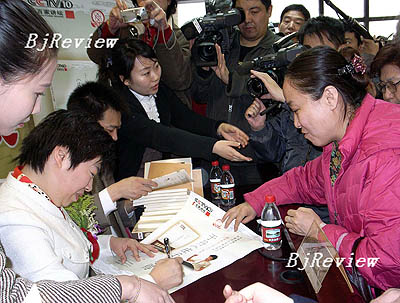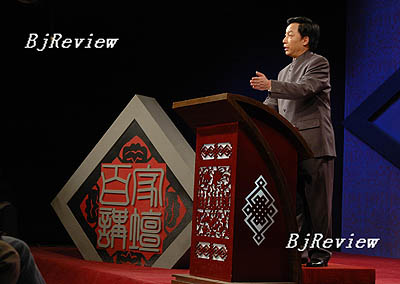|

The past is catching up with China and it's now cool to learn history. Public demand for the who, why and when of events and people in ancient times is seeing a new craze in a country with 5,000 years worth of resources to delve into.
While popular TV soaps about China's past emperors have certainly whetted the appetites of an often critical public, most of the rush toward all things historical is said to have been sparked by the popularity of a TV program called Lecture Room on the science and education channel of CCTV, the nation's official broadcaster.
Since the program began in July 2001, many scholars and professors have been invited into the studios to talk about China's history, culture or literary classics. The style of the lecturers is different from the stereotyped history teaches in schools. Their teaching style is more in the story-telling mode, using simple language, easy to understand by the mass audience. Because of its unique orientation, the program's ratings have soared.
The media has turned the lecturers into celebrities with their own fan base. Some have written books, which have leapt to the top of the bestseller lists.
Yan Chongnian, one of the program lecturers, broke the rating record for the CCTV science and education channel in 2005 with his series of lectures on emperors of the Qing Dynasty (1644-1911). Born in 1934, Yan was the former Director of the Institute on Manchu Studies of Beijing Academy of Social Sciences. His book based on the CCTV lectures was a big hit reprinted 15 times in one year, with a circulation of more than 300,000 copies. This book has also triggered a wave of history book publishing.
"It is unbelievable for academic history books," said Wan Wei, producer of the Lecture Room, referring to the record sales of Yan's book.
"It is not just the result of a TV program, it reflects the thirst of the public for knowledge about traditional culture and history, " said Wan.
Yi Zhongtian, a professor at Xiamen University and lecturer on Lecture Room, has also become famous overnight. His lectures focused on heroes in the Three Kingdoms Period (around 184-280). He is liked by audiences because of his unique perspective of defining historical figures and the humorous narrative way of telling history. He uses some contemporary buzzwords to explain historical events and persons, attracting thousands of young fans.
After his appearance on TV, his book, Melancholy of an Empire, based on his lectures on figures in Han Dynasty (202 B.C. -A.D. 220) sold out. The book was reprinted five times in six months.
With the success of the Lecture Room, other history books have also become new favorites among readers. In the bestseller lists of bookstores, history books occupy the first places. Many publishing houses are competing to invite historians to write books.
"In the recent one of two years, history books no matter academic or literary have sold much better than other social science books such as those focused on travel, culture and biographies, " said Chen Yanjie, sales clerk in charge of history books in the Xidan Bookstore, one of the largest bookshops in Beijing.

All the top selling history books use the technique of having the characters share the same feelings with people in modern life. This link across time is unprecedented in former history books or textbooks.
A good example of history book publishing fervor aroused by Lecture Room is the popularity of the series of books called Events in Ming Dynasty. Before being published they were the contents of a blog written by Dangnian Mingyue, pen name. The contents on his blog soon aroused attention of netizens because of the lively narration of history. The author has transformed historical figures from mere names and symbols into living people who could be part of today's society. This makes the text flow in readable style, totally unlike a textbook.
CCTV's Wan Wei said one of the salient reasons for this surge in history popularity is the audience's need to know. "People want to know more things about the history of our country than what is contained in the textbooks, " said Wan.
Wan said an example of this need is that people are interested in the personality of historical figures or what contribution an emperor has made to the development of China. "We have to listen to this need," he said.
Wan said the principle of the program Lecture Room is very clear. It is designed to arouse interest of the public to the traditional culture and history through the enthusiasm of scholars. This is best exemplified by Ji Lianhai, one of the program lecturers, who said that every scholar on the program should play a role to publicize history.
Gu Xiaoming, a history professor at Fudan University in Shanghai, is a firm supporter of popularizing history in this way. He said that using humor and contemporary connections to spread historical information is the way to go. "The dull and heavy historical data or narrations do not touch the soul of history. People read or learn history to find the philosophy of life," he said.
However, some Chinese historians warned that the so-called history book fever is not a true reflection of a boom in history research and study in China, as the majority of academic history books still lie ignored on bookstore shelves.
Er Yuehe, a Chinese writer, well-known for his history novels, argues that all the lecturers on the Lecture Room are top quality academics and should be respected. "What they are teaching is not just history, but also the thinking and sentiment of that time, which can affect the process of learning history of our whole nation," he said.
"Our program needs more lecturers of this caliber," Wan echoed, adding that Lecture Room will continue to popularize history. But he admits these lecturers are hard to find, and their availability presents the biggest obstacle to maintaining the programs momentum. They need strong academic backgrounds and a presentation style that is attractive to audiences he said.
Ge Jianxiong, an eminent historian with Fudan University, said stoking up interest in history is always a good thing, but the process should meet the demands of people at different levels and always be based on facts of the history.
It is often said that to know a nation's future you must know its past. The current wave of history fever is certain to help the public at large get to know more about themselves and their future.
But as Ge said, keeping a positive attitude and objective understanding while learning is as important as lecturers planting the seeds of interest. | 